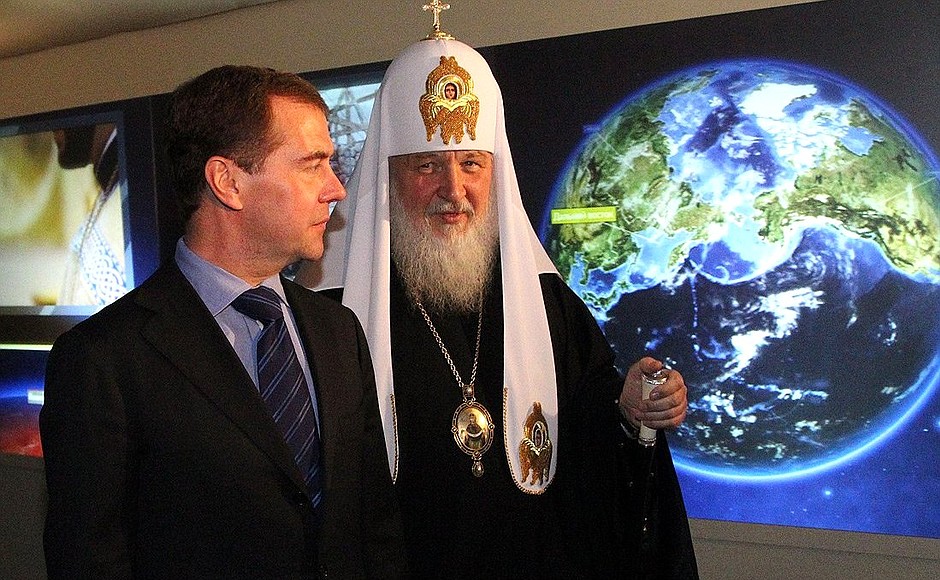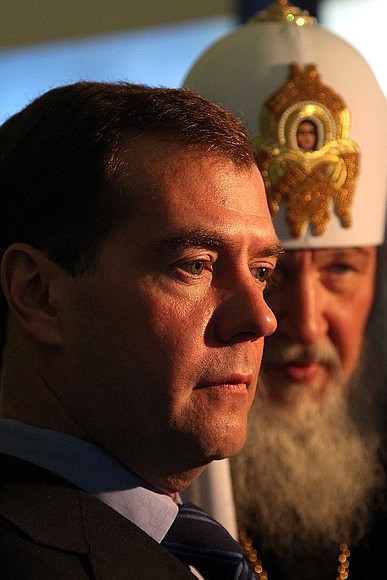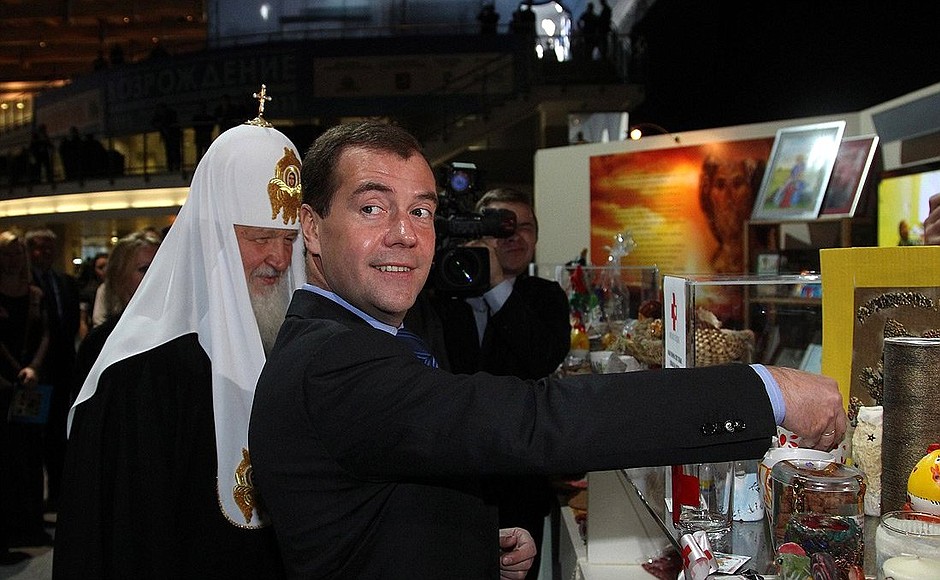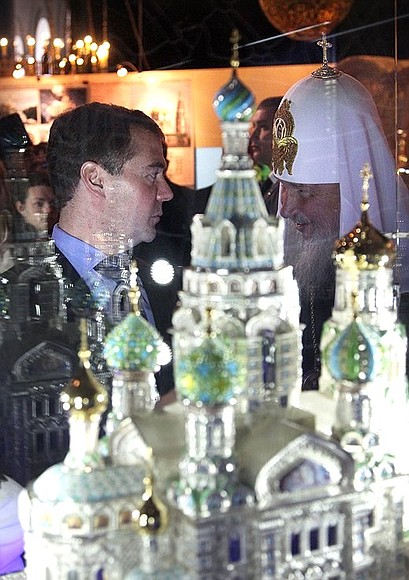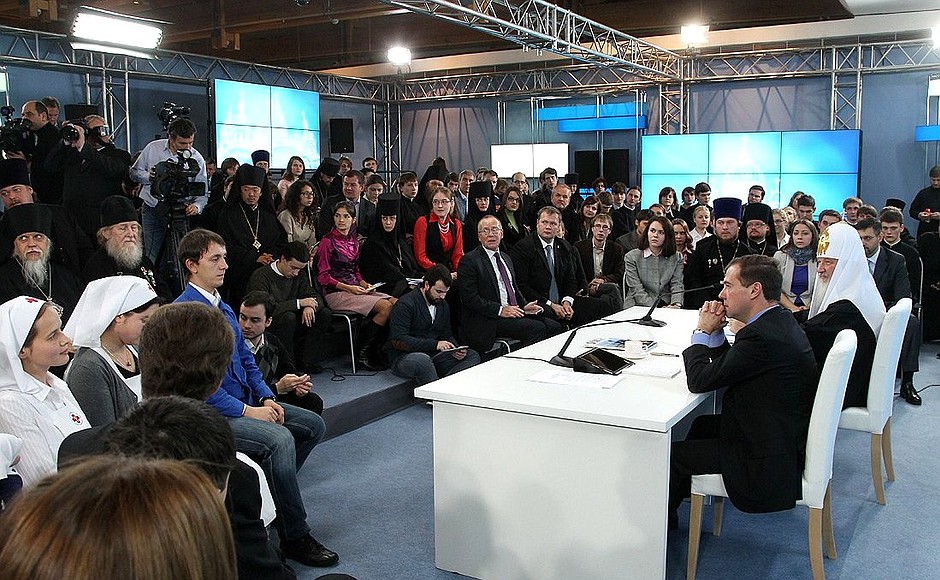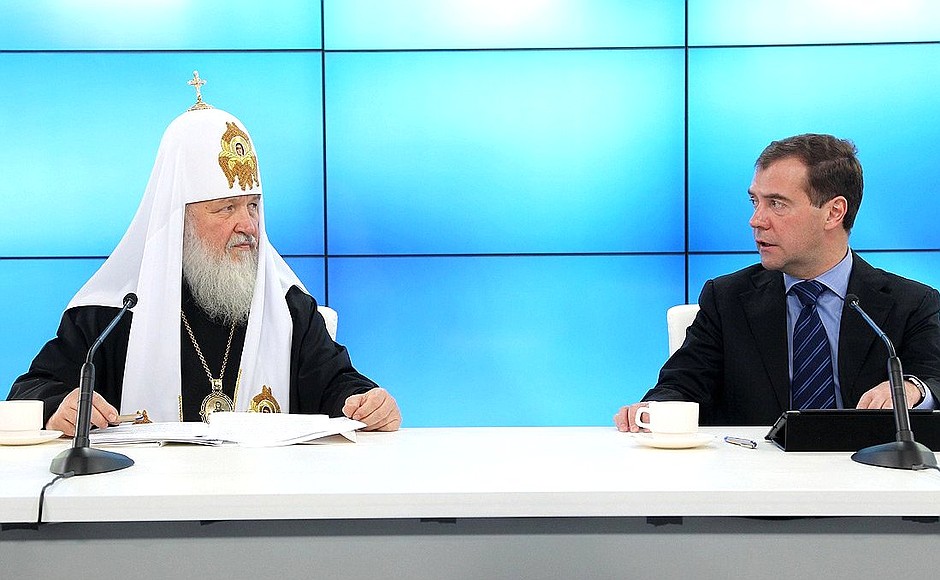Before the meeting, Dmitry Medvedev and Patriarch Kirill of Moscow and All Russia toured several exhibitions devoted to the history of the Russian Orthodox Church.
* * *
President of Russia Dmitry Medvedev: Your Holiness, Friends,
It is a pleasure to greet you here. His Holiness and I have just visited the Orthodox Russia anniversary exhibition. It left a very positive impression on me and I hope that everyone present has also taken the time to see it. It not only reflects the current state of the Russian Orthodox Church, the history of the church and of our country, but it is also fascinating in the way it has been put together. I think this is very good and important that such exhibitions are organised.
”We live in a complex country but it is an open state, based on democratic values. Here everyone is free to choose many things for themselves, their philosophy and purpose in life, their religion and political views. Every person has many choices.“
I would like to say a few words before we begin our meeting. The start of the second millennium of Orthodoxy in our country, of the Russian Orthodox Church, was a time when great many people in Russia turned to faith, and we can see this trend continuing today. This is not only due to the fact that a great deal of churches has been reconstructed, many new churches built and the Church has overcome the schism that divided the world for nearly a century; vigorous spiritual life has resumed. All this happened over a period of twenty years, which is quite a short period of time. In fact, if we look at it from a historical perspective, it is no more than an instant.
If we talk about what happened in those twenty years, from my own perspective of an Orthodox Christian, I would say that it was a miracle. To be honest, as I have said many times to His Holiness, I could not imagine 15 or 20 years ago that the renaissance, the return to faith for a vast number of our compatriots will proceed at such a pace. It was very difficult to imagine, and in this sense it really is a miracle. On the other hand, as the head of state, as the President of our country, I would also like to add that all of this became possible as a result of the efforts of His Holiness the Patriarch, the enthusiasm of philanthropists engaged in this work, as well as the Government’s position – this deserves a mention too. This is all very good.
”I could not imagine 15 or 20 years ago that the renaissance, the return to faith for a vast number of our compatriots will proceed at such a pace. It was very difficult to imagine, and in this sense it really is a miracle.“
Today, thanks to our joint activities and through the efforts of His Holiness, the Church cooperates with state agencies and public institutions. Over the past few years we have been able to launch some very important initiatives, which I would also like to mention at the outset of our conversation. There was much dispute over these initiatives and no action was taken for some time. I am very pleased that these joint initiatives between the state and the church were implemented in the recent period.
I am referring to teaching the basics of Orthodox culture and the introduction of this new subject in Russian schools. In the past two years, beginning with the fourth quarter of the 2009–2010 academic year, students in 10,000 schools in 21 regions across the country began to study, with their parents’ consent, the Values and Traditions of the Orthodox Faith. Next year, the Foundations of Religious Culture will be taught in all Russian regions. There are probably certain difficulties and subtleties involved but, nevertheless, the decision was made and it has been executed. Most importantly, it has greatly benefited the students.
Our second common cause in the recent period is the establishment of military and naval clergy in the armed forces. Here too, gradual progress is being made. As far as I know, nineteen priests have already begun their work. There are plans for a phased development and strengthening of this institution. Perhaps we should act more vigorously, which would require state will. I think it is time for the Defence Ministry to boost its efforts. His Holiness and I have also discussed this and I will issue relevant instructions to the Defence Ministry.
I would like to reiterate that there was a great deal of heated debate about these initiatives from the moment of their introduction. In a number of cases the authorities in turn gave and withdrew their support, and public opinion changed as well. Once again, I would like to emphasise that I am very pleased that together with His Holiness we put an end to the debate about these proposals and today they are being implemented in practice.
We live in a complex country but it is an open state, based on democratic values. Here everyone is free to choose many things for themselves, their philosophy and purpose in life, their religion and political views. Every person has many choices. I reiterate, we are an open country; we are open to new knowledge, interesting ideas and useful information.
”To be able to oppose negative trends, it is imperative that all healthy social forces in our country join efforts. We must find enough energy and will in ourselves to promote our state’s traditional values.“
However, it is true that in addition to valuable and productive trends, very dubious ideologies and all sorts of rubbish also penetrate society, and ultimately this is harmful. I am referring to various destructive doctrines that give rise to social discord, enmity, violence and instability in our country, and unfortunately, these things simply cripple people. These doctrines are particularly dangerous for fragile souls – for young people, for those who are still choosing their values. To be able to oppose such negative trends, it is imperative that all healthy social forces in our country join efforts. We must find enough energy and will in ourselves to promote our state’s traditional values. This is especially important in a complex and rapidly changing world, in the global information space, which not only creates numerous advantages but also presents serious challenges.
In our country, the Orthodox Church has been the guardian of enduring values and immutable truths. It helps a tremendous number of people not only to find their place in life but also to understand the seemingly simple things, such as what it means to be Russian, what our nation’s mission is, what made it great and unique in a certain period and what created many challenges for our people, our state and for the Orthodox Church.
The history of our country is inextricably linked with the Orthodox Church: that is a well-known truth. For me personally it was a revelation of sorts when I realised this vitally important fact. It was a startling contrast with how history was taught in the Soviet times, although I received my education in the period of transition between eras, in the 1980s. I believe it is crucial for many more people to understand this.
It is also important for Orthodox believers to distinguish between what is good in the world today and what is evil, what is fair and what is unfair because our people have always been unique in their thirst for justice. The desire to understand the truth and justice is a moral imperative that every person in this country has carried in his or her soul for some time. I believe it is essential for all of us to understand that now. This is why our state, which is secular, is interested in involving the Church in the education of children and young people, in creating new role models and supporting the defenders of our homeland.
Our traditional national values have always been the foundation for promoting inter-ethnic peace and religious harmony in our multinational country. I am confident that this will continue to be true in the future and that is why I would like to express my gratitude to all those present for everything you do to strengthen peace and spiritual values in our society.
<…>
Please allow me to say a few words in conclusion. His Holiness the Patriarch began by saying that our hearts are glad because this relatively small room contains the essence of our church. I would like to add, from my perspective as president, that in addition to the church, our country is represented here too. Because everyone sitting in this room represents a very large, very complex, and at the same time great country: our dear Russia. They do so in very different ways. People who have been ordained and serve the Russian Orthodox Church are here, helping a huge number of our people cope with life's challenges, find themselves, and find their path in life. This is very important even during a period characterized by a high degree of harmony between the church and the state or, as His Holiness said, a symphony of interests.
”Our state, which is secular, is interested in involving the Church in the education of children and young people, in creating new role models and supporting the defenders of our homeland.“
But this was not always the case; the twentieth century was very frightening. There are people here who work in very different places and some who are still studying, and those who think of themselves as Orthodox Christians, who have chosen their life path, who cannot conceive of their own development as a Christian independently of that of the entire country's.
Not without reason, I said in my opening remarks that in some sense for me it was a revelation when I, already a mature person, was baptized as an adult – I was more than twenty years old. And at that time I realised that the history of our country – Russia, the history of Rus – is at the same time the history of Orthodoxy. For me it really was a period of discovery, particularly because of the well-known ideological dogmas imposed during the Soviet period.
In fact everyone who is present here is a citizen of the same large country, and also people who have compatible opinions regarding its development. I would first of all like to thank you because the active demeanour you've adopted furthers our country's development, no matter where you are or what you're doing. Secondly, I would like to express the hope that in the future our country will be able to rely on such active, strong people with very powerful internal energy and a strong moral sense. Because in our very complex world it is almost impossible to imagine that success can be achieved by people who are lethargic, weak, and who lack moral foundations; people who have no faith. I sincerely hope that our joint efforts will be successful. Thank you very much.
